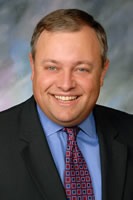Governor’s Pre-K Program for 3-Year-Olds Dies in Senate Appropriations Committee
 Senator Glenn Coffee
Senator Glenn Coffee
Gov. Brad Henry’s controversial plan to create a state-funded pre-kindergarten program for three-year-olds is dead for the next two years following a tie vote in the Oklahoma Senate Appropriations Committee.
The bill, SB 518, died on an 8 to 8 vote Wednesday. Under the Senate’s new power-sharing agreement, a bill receiving a tie vote on “final action” in a committee is dead for the next two years.
Senate Co-President Pro Tempore Glenn Coffee said the bill’s defeat does not signal the end of bipartisanship in the evenly divided Senate. It is just an example of a policy difference between the two parties on a specific proposal.
“I am proud of the eight members of the Appropriations Committee who took this brave stand and said our state should not commit to this expansion of government at a time when we are facing a tight budget,” stated Coffee, R-Oklahoma City. “But Senate Republicans continue to look forward to working with Gov. Henry on areas where we can find common ground, like fixing the Teacher Retirement System.”
Coffee said there is also significant division among early childhood education advocates about whether Henry’s plan is an effective one.
Republican Floor Leader Owen Laughlin, a member of the Appropriations Committee, said the estimated $15 million cost for the pilot program would be better spent on existing public education programs.
“We would be better off using this money to help pay for existing mandates the Legislature has placed on our public schools,” said Laughlin, R-Woodward. “I am concerned that this program could grow year after year, siphoning funds away from common education.”
Appropriations Committee Co-Chairman Mike Johnson, R-Kingfisher, noted that funds simply are not available to create new programs this year.
“We have said over and over that we must be cautious about creating or expanding programs this year because the funds just won’t be available,” Johnson said. “We must prioritize the budget and fund our needs before fund our wants. For example, the state’s program for four-year-olds and the full-day kindergarten program have not been fully funded. Why should a new program be created to include three-year-olds when there is not enough funding to pay for the current programs?”
 Oklahoma Senate
Oklahoma Senate

